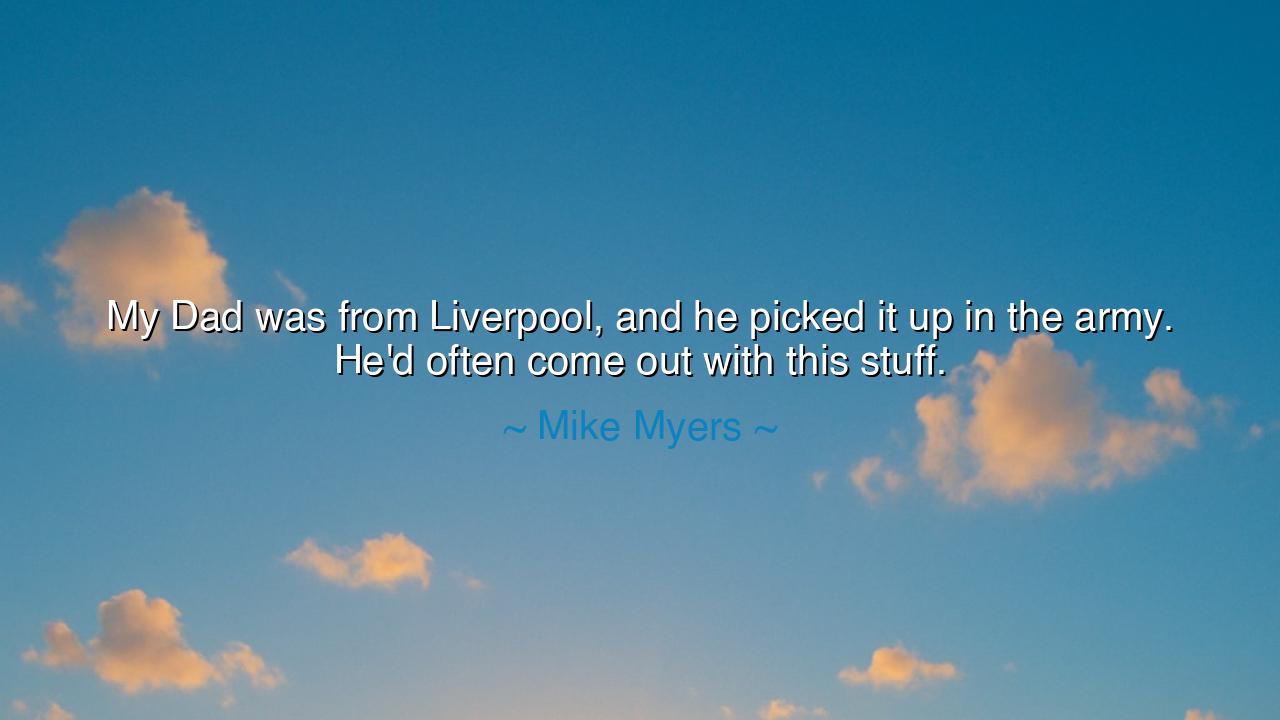
My Dad was from Liverpool, and he picked it up in the army. He'd
My Dad was from Liverpool, and he picked it up in the army. He'd often come out with this stuff.






In a voice filled with warmth and memory, Mike Myers, the actor and storyteller, once said: “My Dad was from Liverpool, and he picked it up in the army. He’d often come out with this stuff.” Though the words are simple, they carry the quiet resonance of heritage, humor, and the unseen shaping of the soul. Within this small remembrance lies the great truth of human inheritance — that who we are is not born in isolation, but carried through the voices, habits, and stories of those who came before us. Myers does not speak merely of speech or phrases; he speaks of legacy, the subtle way a father’s life echoes in the son’s.
The origin of this quote lies in Mike Myers’ recollection of his father, Eric Myers, a man of Liverpool — the city of seafarers, workers, and storytellers. Liverpool, forged by trade and tempered by war, was a place where wit was armor and humor was hope. His father, having served in the army, carried the language of soldiers — a rough, clever poetry learned in the barracks and on the march. It was in that crucible of camaraderie and hardship that he “picked it up,” as Myers says. The jokes, sayings, and phrases of the army became more than words — they were a way of seeing the world, of turning endurance into laughter. And so, when Eric spoke them in his home, he was not merely recalling the past; he was passing on the spirit of resilience that had once carried him through the trials of youth.
In Myers’ memory — “he’d often come out with this stuff” — there is affection, amusement, and reverence intertwined. Every family, across every age, carries such echoes: a parent’s sayings, gestures, or turns of phrase that become the quiet pillars of memory. What a father “comes out with,” whether wisdom or wit, lodges deep within the child’s heart. Myers’ career in comedy, his gift for mimicry and character, bears the mark of this inheritance. The humor of Liverpool, sharp and unpretentious, mixed with the discipline and storytelling of the army, formed the soil from which his artistry grew. Thus, what might seem a casual remark about his father’s sayings becomes a meditation on the mysterious alchemy by which personality and art are born from ancestry.
The ancients, too, understood this truth. In the temples of Greece and the courts of China, it was taught that character flows from lineage, not by blood alone, but through the habits of thought and speech passed from parent to child. The philosopher Confucius spoke of filial piety — the sacred duty to honor one’s parents not merely through obedience, but by carrying forward their virtues. Likewise, in the tales of old England, the wisdom of the fathers was said to live “in the tongue and in the hands of their sons.” Myers’ remembrance is part of this same lineage: the laughter of the father becoming the legacy of the son, the language of the past finding new life in the creativity of the present.
Consider the story of Charles Dickens, who, as a child, watched his father fall into debt and disgrace. From that pain, Dickens inherited both compassion and humor — the ability to find humanity even in suffering. His father’s failings, his quirks, his speech — all became part of the great mosaic of Dickens’s art. Just as Myers’ father’s words “came out” unexpectedly, shaping his son’s imagination, so too did Dickens transform his father’s contradictions into the timeless characters of his novels. In both men, we see the same truth: the influence of a parent is not a single event, but an ongoing current, shaping the heart long after the voice has gone silent.
There is a lesson here, quiet yet profound: honor the words and ways that shaped you. Even the smallest phrases — a family saying, a joke told around the table — are fragments of history, tokens of love and endurance. Too often, we dismiss these humble inheritances, thinking them trivial. Yet they are the roots from which identity grows. To remember them, to repeat them, is to keep the chain of humanity unbroken. Myers’ affection for his father’s sayings is not nostalgia; it is gratitude. Through those words, his father still speaks — and through him, that wit and spirit touch millions.
So, my children of the future, remember this: your story began before you were born. The language you speak, the humor you share, the values you carry — they are the gifts of those who walked before you. Listen for their voices in your memory. Treasure their sayings, their habits, even their flaws, for within them lies your own becoming. And when your time comes, “come out with this stuff” yourself — pass it on, so that laughter, courage, and love may endure. For as Mike Myers reminds us, the simplest memories are often the truest monuments, and through them, the spirit of family becomes immortal.






AAdministratorAdministrator
Welcome, honored guests. Please leave a comment, we will respond soon